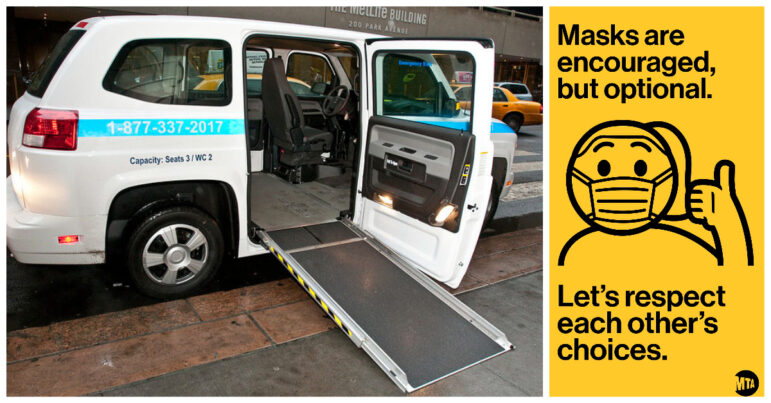“With the mask mandate lifted, Access-A-Ride users face the unimaginable choice between risking their lives to simply get where they need to get or going back to isolating themselves in their homes.”

Metropolitan Transportation Authority / Patrick Cashin
Left: an MTA paratransit vehicle. Right: signs for the MTA’s optional masks policy, in place since September 2022.New York City is facing an enormously high concurrent spike of virus cases as a result of the dangerous combination of COVID-19 variants, RSV, and the flu—a “tripledemic.” During the height of the pandemic, masking requirements protected many New Yorkers not only from COVID-19, but also from the usual winter illnesses including the flu. That won’t be the case this winter.
Masks are particularly critical in crowded, indoor spaces and especially for our most vulnerable friends and neighbors, including persons with disabilities and senior citizens. In order to protect these New Yorkers, it is therefore essential that the MTA immediately reinstate the mask mandate on Access-A-Ride, New York City’s public paratransit service for people with disabilities.
The science is clear: masks work. One-way masking reduces risk, but not as much as if all parties are masked. A recent study by The Lancet, a leading peer-reviewed medical journal, found that maintaining face mask use while riding public transportation greatly decreased COVID-19 transmission rates and created safer environments for riders. Furthermore, both the Centers for Disease Control and Prevention and the New York City Health Commissioner Dr. Ashwin Vasan strongly recommend wearing masks indoors and even outdoors where there are crowds. However, the MTA continues not to require masks while riding the bus, subway, or Access-A-Ride.
Like most New Yorkers, people with disabilities ride public transportation every day to work or school, or simply to go about their daily lives. However, unlike many New Yorkers, people with disabilities—nearly 200,000 of whom must use Access-A-Ride due to the severity of their disabilities—are among the most at-risk to contract one or more of the triple threat illnesses, due to compromised immunity.
By design, Access-A-Ride’s paratransit system confines the driver and up to three riders and their aides/companions—a group of complete strangers—into small spaces for long car rides, often driving across multiple boroughs. With the mask mandate lifted, Access-A-Ride users face the unimaginable choice between risking their lives to simply get where they need to get or going back to isolating themselves in their homes.
Masks are part of an effective response to airborne diseases like COVID-19, RSV, and the flu, which make them crucial in places where social distancing is not possible, including on public transportation. Access-A-Ride transports individuals not only to work, school, and other activities, but also to doctor’s appointments, chemotherapy, rehabilitation facilities, and other health-related venues, and therefore must be seen as an extension of the health care system, which is already under a state mask mandate.
The MTA must reinstitute the mask mandate for the health of vulnerable New Yorkers, and contrary to the statement of MTA Chair and CEO Janno Lieber, the MTA is an independent entity with both the authority and responsibility to do so. Throughout the pandemic, the MTA has initiated many COVID-19 precautions ahead of or without the advice of government health officials. Access-A-Ride eliminated shared rides without a public health mandate and made special arrangements to transport COVID-19 patients without a public health authority’s mandate. Additionally, the MTA continued to spend millions of dollars on sanitizing surfaces long after public health authorities recognized the threat was airborne.
Today, however, the MTA’s messaging—which emphasizes that masks are optional—departs from city, state, and federal guidance strongly recommending masks.
At an MTA board meeting on Dec. 21, following compelling testimony from the Access-a-Ride Reform Group (AARRG!) and many other Access-A-Ride users and health experts, three board members expressed their support to reinstate the mandate for Access-A-Ride, but were subsequently shut down based, as AARRG! was later told, at least in part, on the assumption that many will ignore such a mandate. Would we decide to remove longstanding criminal laws just because we believe they would be ignored?
Wearing masks on public transportation is a minor inconvenience to most riders, an annoyance far outweighed by the added protection that masking provides to vulnerable riders on crowded paratransit vehicles. We must all do our part to control the spread of all three viruses impacting our communities, and that includes masking up.
We call on the MTA and Chair Lieber to immediately re-institute the mask mandate on Access-A-Ride and embark on a public information campaign that encourages people to wear masks on subways and buses as well, to protect all New Yorkers.
The MTA is in charge of New York’s transit system, and that means they are in charge of the safety of each person who uses that system. Our safety depends on the MTA taking action—now!
Ruth Lowenkron is director of the Disability Justice Program at New York Lawyers for the Public Interest (NYLPI). Sharon McLennon Wier is the executive director of the Center for Independence of the Disabled, NY (CIDNY). Both NYLPI and CIDNY are founding members of the Access-A-Ride Reform Group (AARRG!), along with Mobilization for Justice and the Brooklyn Center for Independence of the Disabled, all of whom recently sent a letter to MTA Chair Janno Lieber expressing concern about the MTA’s refusal to reinstate the mask mandate.









2 thoughts on “Opinion: MTA Must Reinstate the Mask Mandate on Access-A-Ride”
Give it a rest. COVID is sooooo over
Covid definitely is not over! My brother is in the ICU on a vent, dx is covid for the second time. He first got it in the summer of 2020 and almost died. Now, he’s back, only this time, not only does he have covid, he has heart and kidney damage from his last bout of the disease. So no, covid is definitely still rearing its ugly head..